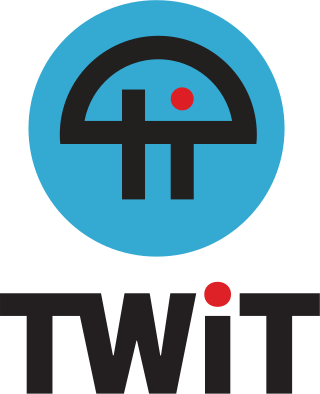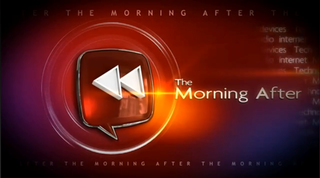Related Research Articles

Streaming media refers to multimedia delivered through a network for playback using a media player. Media is transferred in a stream of packets from a server to a client and is rendered in real-time; this contrasts with file downloading, a process in which the end-user obtains an entire media file before consuming the content. Streaming is more commonly used for video-on-demand, streaming television, and music streaming services over the Internet.

The Orchard Enterprises NY, Inc., doing business as The Orchard, is an American music and entertainment company, specializing in media distribution. It is a subsidiary of Sony Music Entertainment, based in New York City. In 2019, the company sold off its film and television division, which was renamed 1091 Media.
Digital display advertising is online graphic advertising through banners, text, images, video, and audio. The main purpose of digital display advertising is to post company ads on third-party websites. A display ad is usually interactive, which allows brands and advertisers to engage deeper with the users. A display ad can also be a companion ad for a non-clickable video ad.
Google AdSense is a program run by Google through which website publishers in the Google Network of content sites serve text, images, video, or interactive media advertisements that are targeted to the site content and audience. These advertisements are administered, sorted, and maintained by Google. They can generate revenue on either a per-click or per-impression basis. Google beta-tested a cost-per-action service, but discontinued it in October 2008 in favor of a DoubleClick offering. In Q1 2014, Google earned US$3.4 billion, or 22% of total revenue, through Google AdSense. In 2021, more than 38 million websites used AdSense. It is a participant in the AdChoices program, so AdSense ads typically include the triangle-shaped AdChoices icon. This program also operates on HTTP cookies.
The term interactive video usually refers to a technique used to blend interaction and linear film or video.
Revver was an American video sharing website that hosted user-generated content. Until its shutdown in 2011, Revver attached advertising to user-submitted video clips and originally offered to share ad revenue with the video creators. Videos could be displayed, downloaded, and shared across the web in either Apple QuickTime or FLV format. In addition, Revver was a video publishing platform that enabled third parties to build their own "Revverized" site. Revver allowed developers to create a complete white label of the Revver platform.

The Gesellschaft für musikalische Aufführungs- und mechanische Vervielfältigungsrechte is a government-mandated collecting society and performance rights organization based in Germany, with administrative offices in Berlin and Munich. GEMA represents the usage rights stemming from authors' rights for the musical works of those composers, lyricists, and publishers who are members in the organization. It is the only such institution in Germany and a member of BIEM and CISAC. Other collecting societies include the (AKM) Society of authors, composers and music publishers in Austria and SUISA in Switzerland.
A varial flip is a type of skateboarding trick in which the skateboard rotates around its vertical axis, or its vertical axis and its horizontal axis simultaneously. The first flip trick, called a kickflip but originally known as a "magic flip", was invented by professional skateboarder Rodney Mullen.

Complex Networks is an American media and entertainment company for youth culture, based in New York City. It was founded as a bi-monthly magazine, Complex, by fashion designer Marc (Ecko) Milecofsky. Complex Networks reports on popular and emerging trends in style, sneakers, food, music, sports and pop culture. Complex Networks reached over 90 million unique users per month in 2013 across its owned and operated and partner sites, socials and YouTube channels. The print magazine ceased publication with the December 2016/January 2017 issue. Complex currently has 6.02 million subscribers and 1.8 billion total views on YouTube. As of 2019, the company's yearly revenue was estimated to be US$200 million, 15% of which came from commerce.

TWiT.tv is a podcast network that broadcasts technology-focused podcasts, founded by broadcaster and author Leo Laporte in 2005, and run by his wife and company CEO Lisa Laporte. The network began operation in April 2005 with the launch of This Week in Tech. Security Now was the second podcast on the network, debuting in August of that year. As of January 2024, the network hosts 14 podcasts; however, due to declining advertisement sales, some are being discontinued, or are only available with a Club TWiT subscription and the TWiT studio was closed in August 2024. Podcasts include This Week in Tech,Security Now, and MacBreak Weekly.
Martin Percy is a British film director known for his innovative work in interactive films and digital learning, often using artificial intelligence in recent years. He has received numerous accolades for this work, including a BAFTA British Academy Award, an Emmy Award, eleven Webby Awards, a Grand Clio in the Clio Awards, and various other awards. Percy has created interactive films for institutions such as the Tate Gallery, the Asian Art Museum of San Francisco, the British Film Institute, the National Theatre, University of the Arts London, BT and Innovate UK. He has collaborated with notable talent including Sir Ian McKellen, Sir Derek Jacobi, and Daisy Ridley. Percy is also a TEDx speaker, talking about his film Lifesaver and 'how to save lives with interactive film'.
Thumbplay is a U.S.-based subscription service that allows users to download music, video and games to their cell phones. Users can manage, store and share their mobile content online and on their wireless devices.
GameZombie TV is a web series that produces original video game shows. GameZombie was the recipient of a Webby Honoree Award for Online Video in 2008 and 2009, a Davey Award, a Webby Award, and a People's Voice Webby Award in 2010, and nominated a finalist for Best Web Video at the 4th Annual Mashable Awards. The student-run game media studio, based out of the University of Wisconsin at Whitewater and Indiana University at Bloomington, has amassed one of the most complete video game developer interview series on the web. GameZombie has created upwards of 450 videos for online distribution. GameZombie's videos have amassed over 8,000,000 unique, aggregate views since the company's first video went online in March 2007. GameZombie TV's constructivist, project-based learning environment is a finalist for the MacArthur Foundation's 4th Annual Digital Media and Learning Competition
A literal music video, also called a literal video version, is a satirical remix of an official music video clip in which the lyrics have been replaced with lyrics that describe the visuals in the video.
Jennifer Aniston Goes Viral, known also as Jen Aniston's Sex Tape, is a viral video advertisement by Glacéau, starring actress Jennifer Aniston, that promotes the smartwater bottled water brand. The video was uploaded to YouTube on 7 March 2011 and had attracted almost ten and a half million views before it was taken down in February 2012.

The Morning After is a Hulu original web series that premiered on January 17, 2011 and ended April 24, 2014. It was produced by Hulu and Jace Hall's HDFilms, streaming Monday through Friday. The show originally featured Brian Kimmet and Ginger Gonzaga as hosts. Later shows used a rotation of hosts including Alison Haislip, Dave Holmes, Damien Fahey, Bradley Hasemeyer, Haley Mancini, Paul Nyhart, and Rachel Perry.
An online video platform (OVP) enables users to upload, convert, store, and play back video content on the Internet, often via a private server structured, large-scale system that may generate revenue. Users will generally upload video content via the hosting service's website, mobile or desktop application, or other interfaces (API), and typically provides embed codes or links that allow others to view the video content.

UNIT9 is a multidisciplinary production company working in different interactive areas: films, games, virtual reality and digital technology. Founded in 1997, UNIT9 operates globally with offices in London, Los Angeles, New York, Florence, Berlin and Poland. Directors, writers and technologists work collaboratively to create content, advertising, utility and gaming. Ad Age Production Company A-List, UNIT9 partners with advertising agencies worldwide on the digital components of campaigns.
Sascha Lazimbat is a German entrepreneur, lawyer and music journalist. After writing primarily about electronic music in the 1990s, in 2004 he founded the company Zebralution together with Kurt Thielen as the first digital distributor for indie labels in Europe. In December 2019, GEMA acquired a majority stake in Zebralution.
References
- ↑ Dowling, Siobhan. "Your Kind of Music" Archived 5 March 2012 at the Wayback Machine , CNBC , Berlin, 9 January 2012. Retrieved on 9 January 2012.
- ↑ tape.tv insolvent und offline, 2016-11-22, Andreas Meixensperger
- ↑ Blackburn, Gavin. "Is tape.tv the future of music television in Germany?", Deutsche Welle , Berlin, 20 May 2011. Retrieved on 5 March 2012.
- ↑ Butcher, Mike (23 May 2012). "Tape.tv Raises $6.2 Million To Begin An International Roll-Out". TechCrunch .
- 1 2 Knight, David (25 May 2012). "After raising 5 million euros in Series B funding: What the future holds for tape.tv". The Next Web .
- ↑ "Tape.tv schrumpft auf 20 Mitarbeiter – Amen-Gründer verabschieden sich". 22 October 2014.
- ↑ Imbert, Marguerite. "Who will be Germanys first market leader in Social TV?", Venture Village , Berlin, 13 January 2012. Retrieved on 5 March 2011.
- ↑ "13th Annual Webby Awards Official Honoree Selections" Archived 17 April 2009 at the Wayback Machine , Webby Awards, New York, 2011. Retrieved on 5 March 2012.